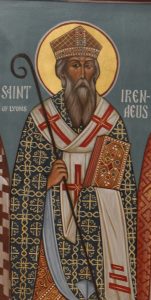 St Irenaeus was born c.130 in Smyrna, Asia Minor (today modern Izmir, Turkey) and was martyred in 202 in Lyons, France; his tomb and relics were destroyed by Calvinists in 1562 but his head rests in Saint John’s Church, Lyons, France. Today the western Church liturgically recalls Irenaeus while the Orthodox Church liturgically recalls his memory on August 23.
St Irenaeus was born c.130 in Smyrna, Asia Minor (today modern Izmir, Turkey) and was martyred in 202 in Lyons, France; his tomb and relics were destroyed by Calvinists in 1562 but his head rests in Saint John’s Church, Lyons, France. Today the western Church liturgically recalls Irenaeus while the Orthodox Church liturgically recalls his memory on August 23.
History tells us that St Irenaeus was a disciple of St Polycarp of Smyrna. In 177, was ordained and later was the Bishop of Lugdunum, Gaul (modern Lyons, France).
His learning and prudence (discretion) identified him as a true “lover of peace” which is what his name implies. You might say that Irenaeus’ enduring legacy speaks to the fact that he worked and wrote against Gnosticism (see his work Against Heresies), basing his arguments on the works of St John the Apostle, whose Gospel is often cited by Gnostics. He is considered the first great Western ecclesiastical writer and theologian, who emphasized the unity of the Old and New Testaments, and of Jesus Christ’s simultaneous human and divine nature, and the value of tradition. The calls Irenaeus a “Father of the Church”. He is clearly among the “greats”.
As one said, “Emerging from the turmoil of the second century, the Church is indebted to Irenaeus for its catholic self-consciousness and its awareness of unity as reflected in the emergence of the canon of Scripture, the interpretation of prophecy, and apostolic succession.”